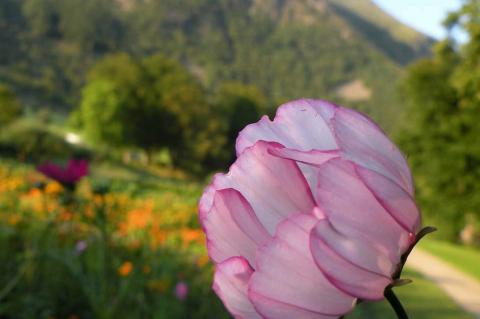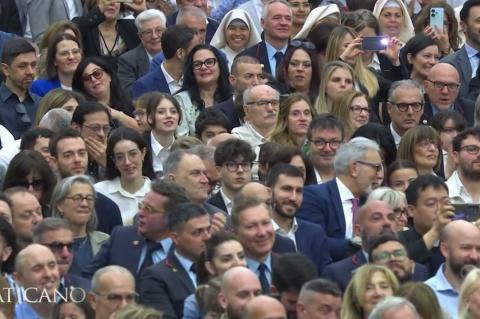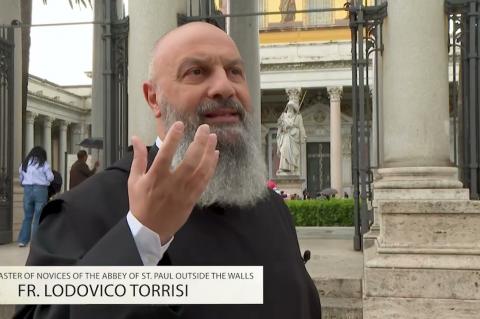From Rome to the World: Evangelization Rooted in Truth and Beauty
From Rome to the World: Evangelization Rooted in Truth and Beauty
Rome holds a central place in illuminating the Catholic principles of Truth and Beauty, serving as a historical and spiritual epicenter for the faith. The city guides all who visit toward the ultimate truth and beauty, as best expressed by the psalmist in Psalm 27:4: "All I ask and this I seek is to dwell in the house of the Lord, and to gaze at His Beauty for ever and ever!"
Pilgrim groups, tourists, and students flock to the Eternal City year-round to visit its historic churches and monuments, experiencing the incredible beauty of Rome. With over 900 churches, the city's beauty and structure are inseparable from the faith that lies at its very heart.
One such group of pilgrims visiting Rome are the participants of the Truth & Beauty Project, a group of young Catholic professionals participating in a weeklong immersion in the city.
Moritz Scholtysik is one such participant in the Truth & Beauty Project. He noted, “Coming to Rome without a Catholic perspective means that you're missing out on the true meaning of Rome. We are in the heart of Europe, essentially the heart of Christian Europe. If you come here with an open heart and an open mind to the Christian history and culture, only then can you truly experience Rome to its fullest extent.”
The Truth & Beauty Project was founded by John and Ashley Noronha seven years ago.
John Noronha, co-founder of the Truth & Beauty Project, explained its inception, “The idea behind the Truth and Beauty project was that we realized there wasn't this comprehensive program where one could truly understand their Christian identity from all different aspects, of really bringing the different fields of knowledge together. Not only knowledge, but also practical living, how to live it out in a world that is presenting happiness and beauty in a very different light from what the true Christian story is all about.”
Ashley Noronha is the other co-founder of the Truth & Beauty Project. Explaining the project, she said, “I would call the Truth and Beauty Project a school of Christian living because it's an experience. A week long experience in Rome that really speaks to answer the questions that I think resonate in all of our human hearts. Why am I here? What is the meaning of life? What is God calling me to?”
The city's rich tapestry of ancient architecture, art, and cultural heritage reveals the Church's historical legacy.
“If you're walking through Rome,” Scholtysik said, “you see the continuity between the ancient times, the pre-Christian times, and then you walk a few streets ahead and then you see also places where there were Pagan temples or Pagan parts of the city, like the Pantheon, that are then being Christianized and now are beautiful churches.”
The grandeur of St. Peter's Basilica, with its dome designed by Michelangelo, stands as a testament to the pursuit of truth through beauty. Every detail, from the intricately designed mosaics to the statues that adorn the basilica, reflects a deep theological message, embodying the belief that beauty is a pathway to experiencing the divine and to understanding deeper truths about God's creation. And these buildings offer the sanctuary and peace of silence to contemplate the Divine, something that seems rarer and rarer these days in major cities.
Another participant Katie Mlinek shared her experience: “Being able to step away and go into these spaces that are much older than you and much grander than you help you remember that you are a part of a bigger story and something much grander than your own individual life.”
Through art, the Church has communicated complex theological concepts in an accessible and profoundly moving manner. This aligns with the Catholic understanding that beauty can lead the human soul towards truth, as art transcends words and evokes a direct emotional and spiritual response.
Anna Fronzaglia also participated in the Truth & Beauty Project. “If we are made in the image and likeness of God, what does that mean and what does Rome do to tell us about that to invite us into that story?” she asked herself. She further explained that understanding this identity helps us to live our identity as Christians, “filled with the opportunity to go back into time, go back into history to be a part of that continuity of 1900 years of pilgrims.”
Pilgrims from around the world flock to the Eternal City, drawn by the desire to connect with the roots of their faith and to witness firsthand the sublime beauty that has been cultivated over centuries.
Rome stands as a beacon of the Catholic conviction that beauty is not merely aesthetic but is integrally linked to the pursuit of truth, offering a profound encounter with the divine through the splendor of its sacred spaces.
Adapted by Jacob Stein






